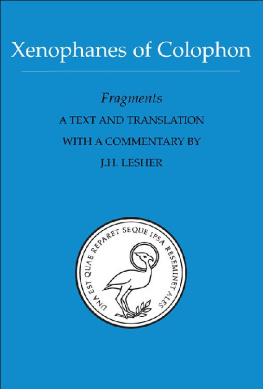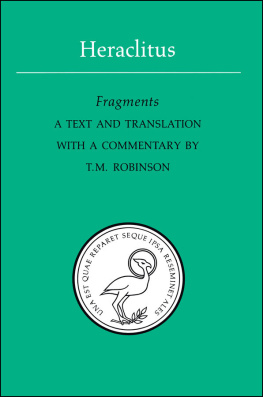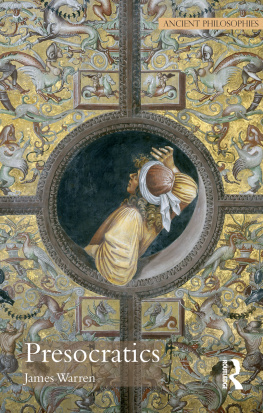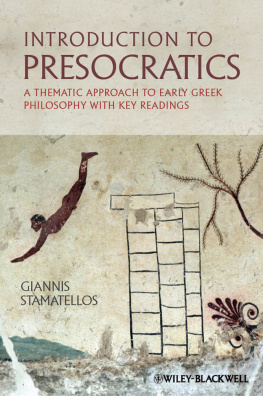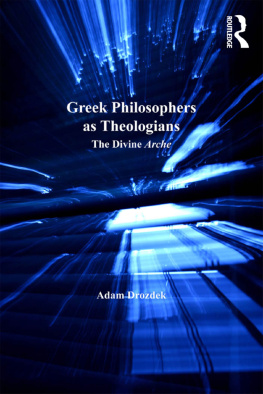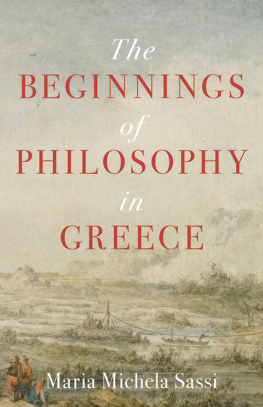Xenophanes of Colophon: Fragments
A Text and Translation with a Commentary
Edited by J.H. Lesher
Xenophanes of Colophon was a philosophical poet who lived in various cities of the ancient Greek world during the late sixth and early fifth centuries BC. In this book, James Lesher presents the Greek texts of all the surviving fragments of Xenophanes teachings, with an original English translation on facing pages, along with detailed notes and commentaries and a series of essays on the philosophical questions generated by Xenophanes remarks. Also included are English translations of all the ancient testimonia relating to Xenophanes life and teachings, and a discussion of how many of the testimonia pose impediments to achieving a consistent interpretation of his philosophy.
The Xenophanes who emerges in this account fully warrants classification as a philosophical thinker: moral critic and reflective student of nature, critic of popular religious belief and practice, and perhaps the first to challenge claims to knowledge about divine matters and the basic forces at work in nature. As with earlier works in the Pheonix series, this volume aims to make an important portion of Presocratic writing accessible to all those interested in ancient philosophy and the first phase of European natural science.
(Phoenix Supplementary Volumes XXX; Presocratics IV)
J.H. LESHER is professor of philosophy at the University of Maryland.
PHOENIX
Journal of the Classical Association of Canada
Revue de la Socit canadienne des tudes classiques
Supplementary Volume xxx / Phoenix Presocratics Volume IV
Tome supplmentaire xxx / Les Prsocratiques Phoenix tome IV
Phoenix Presocratics / Les Prsocratiques Phoenix
General Editors / Rdacteurs en chef
David Gallop Trent University
T.M. Robinson University of Toronto
Xenophanes of Colophon
FRAGMENTS
A TEXT AND TRANSLATION
WITH A COMMENTARY BY
J.H. LESHER
University of Toronto Press Incorporated 1992
Toronto Buffalo London
Printed in Canada
Reprinted in paperback 2001
ISBN 0-8020-5990-2 (cloth)
ISBN 0-8020-8508-3 (paper)
Printed on acid-free paper
National Library of Canada Cataloguing in Publication Data
Xenophanes, ca. 570-ca. 478 B.C.
Xenophanes of Colophon : fragments :
a text and translation with a commentary
(Phoenix. Supplementary volume ; 30 = Phoenix.
Tome supplmentaire, ISSN 0079-1784 ; 30)
Greek text with English translation and commentary.
Includes indexes.
Reprint. Originally published: Toronto : University of Toronto, 1992.
Includes bibliographical references.
ISBN 0-8020-8508-3
1. Xenophanes, ca. 570-ca. 478 B.C. 2. Philosophy, Ancient.
I. Lesher, J. H. (James H.) II. Title. III. Series: Phoenix.
Supplementary volume (Toronto, Ont.) ; 30.
B258.X32E5 2001 182 C2001-902936-5
This book has been published with the help of a grant from the Canadian Federation for the Humanities, using money provided by the Social Sciences and Humanities Research Council of Canada, and a grant awarded by the General Research Board of the Office of Graduate Studies and Research, University of Maryland at College Park.
For my mother
and in memory
of my father
CONTENTS
INDEXES
Names and Subjects
ACKNOWLEDGMENTS
I am indebted to the editors of this series for inviting me to undertake this volume and for providing both criticism and encouragement along the way to its completion.
I am also grateful to my colleague John Duffy for many discussions of questions of translation, to Lawrence Jost, John Kazazis, and Hugh Lee for helpful suggestions, and to Ellen Roth, librarian of the Center for Hellenic Studies, for assistance in obtaining research materials. A portion of was presented to a seminar on Presocratic philosophy at the University of Pennsylvania. I am grateful to Charles Kahn and the members of his seminar for their helpful comments. Aryeh Finkelberg, Andrei Lebedev, and Alexander Mourelatos were kind enough to supply prepublication copies of their recent papers on Xenophanes. Darlene King has done her usual excellent job of transforming masses of manuscript into an orderly text. Many improvements resulted from the careful attention given to the text by Joan Bulger and John St James of the University of Toronto Press, and by the typesetter, Philippa Matheson.
This book was written during an extended period of sabbatical leave from the University of Maryland arranged through the good offices of (then) Provosts W.E. Kirwan and I.L. Goldstein.
J. H. LESHER
University of Maryland
1992
ABBREVIATIONS
D-K | Diels-Kranz |
|---|
GG | Goodwin and Gulick |
|---|
KRS | Kirk, Raven, and Schofield |
|---|
LSJ | Liddell, Scott, and Jones |
|---|
PREFACE
This study, like the other volumes in this series, focuses on the views of one member of a group of philosophers who lived in ancient Greece before and during the time of Socrates. But whether its subject, Xenophanes of Colophon, was really a philosopher has long been a matter of debate. For Harold Cherniss, Xenophanes was a poet and rhapsode, who has become a figure in the history of philosophy by mistake, There are also enough dubious elements in the portrait of Xenophanes as Eleatic monist to warrant real scepticism about his claim to being the founder of Eleatic philosophy.
Yet Xenophanes has impressed some scholars as a paradigm of the Presocratic genius in virtue of the wide range of his interests and his ability to provide rational explanations for matters commonly supposed to lie beyond human understanding. One can always debate claims to genius, but the study that follows will fully warrant a positive assessment of Xenophanes as philosopher: outspoken critic of common opinion and the leading poets of Greece, advocate for inquiry into natural causes, proto-epistemologist, and innovator in both religion and morality.
We should concede that, at least on the basis of what we know of them, his teachings did not possess the degree of rigour and profundity attained by Parmenides (few have!), nor were they expressed with the artistry of Heraclitus. Yet Xenophanes did make a series of insightful observations across a range of topics that was unusually broad, even for an Ionian thinker: on the nature of the divine, superstitious practices, and misconceptions about the gods; on the proper measures of moral excellence and social utility; on eclipses, rainbows, fossil finds, and the origins of the cosmos; and on the tenuousness of our conceptions of the gods and of how all things are. These teachings, I shall argue, left a philosophical legacy to Parmenides, even if Xenophanes was not the founder of Eleatic philosophy. There is in any case ample reason to study his ideas as well as his verses, and to include him in our histories of early Greek philosophy along with his Milesian, Samian, and Ephesian counterparts.
But there are obstacles in the path of adequately understanding and assessing his ideas. The world he probably knew best was that of aristocratic households throughout the Greek land; the interests of his actual and intended audiences must have been vastly different from our own. This distance in time and culture compounds the difficulties already created by the meagreness of the information that has come down to us from antiquity. It is a commonplace that we possess only a fraction of the teachings of the Presocratics and that we must rely for our sources on persons who often quoted from the Presocratics with an ulterior motive in mind. A recent study has challenged the legitimacy and credibility of the whole reconstructive enterprise, it nevertheless reminds us of the barriers that lie between us and the
Next page
